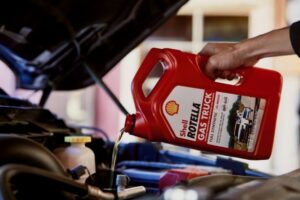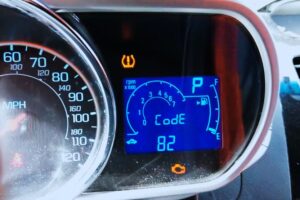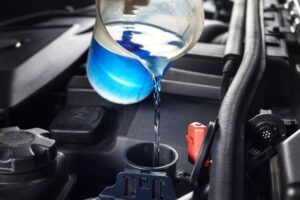Antifreeze is very important for the continuous running of your engine. Without using antifreeze, your engine will overheat easily. But does antifreeze expire? Does it go bad?
If the antifreeze is kept in a sealed bottle, its shelf life will be indefinite. Once you open the bottle, it will still have a long shelf life if you store it in its original container. While antifreeze and pre-mixed coolant will last for years, antifreeze that is not mixed with water tends to last longer.
There’s a way to know if your antifreeze is still good. Using a multimeter and running your engine, you can measure the voltage, showing that your antifreeze can still do its work. If the voltmeter reads 0.4 volts or less, your antifreeze is still okay. The ideal reading is around 0.3 volts.
Read on to learn more about the antifreeze in your car and how to tell if it is still good or if it has already expired.
Does Antifreeze Expire?
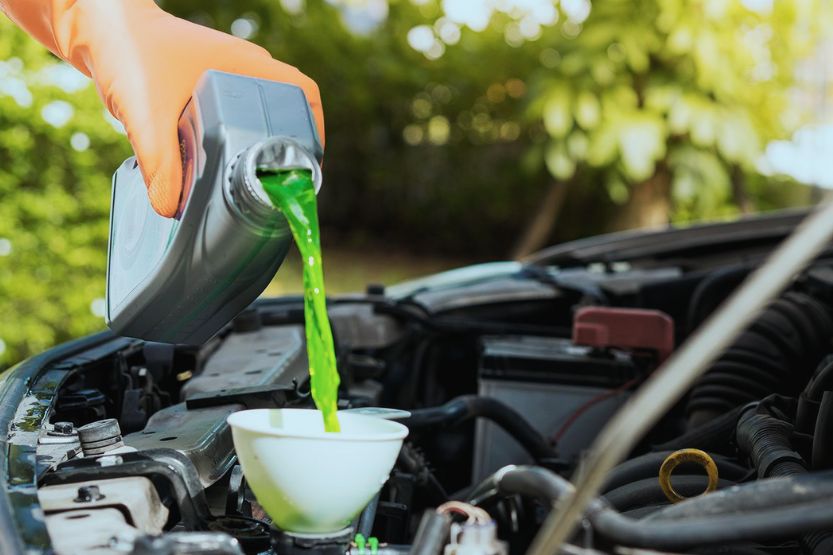
Does Antifreeze Go Bad?
If you keep the antifreeze in its original sealed bottle, it will have an indefinite shelf life. Even if you open the bottle but keep the antifreeze inside, it will still have a long shelf life.
Although both antifreeze and pre-mixed coolant have long shelf lives, antifreeze stays longer if it is not mixed with water.
Use a Multimeter to Determine the Antifreeze’s Condition
You will know if your antifreeze is still good by using a multimeter. Start your engine and wait until it reaches its normal operating temperature. Then insert the positive probe of the multimeter directly into the coolant.
And then rev the engine to 2,000 rpm. Put the multimeter’s negative probe on the battery’s negative terminal. The meter should read 0.4 volts or less if the coolant is still in good condition. The ideal reading is around 0.3 volts.
Be aware that antifreeze will weaken over time. That’s why you need to test it to see if it still can provide the cooling effect that your engine needs. It’s not good to base your evaluation on its color and level inside the coolant reservoir.
Consider an Antifreeze Flush When the Antifreeze Reaches Mileage Threshold
You may see that the antifreeze level in the reservoir is still full, and your test shows it is still okay. But if it says in the operator’s manual that it has already reached its mileage threshold, you should consider an antifreeze flush.
How often you should flush the antifreeze will depend on several factors, including:
- Vehicle type,
- Current mileage, and
- Coolant’s average life.
Antifreeze Flush
Generally, an antifreeze flush is recommended every five years or 100,000 miles for extended dry coolants and after every two years or 30,000 miles for silicate coolants.
How Long Does Antifreeze Last?
Lasts Long When Stored in Its Original Bottle
Antifreeze does not lose its cooling capabilities quickly. How long does antifreeze last? If it is stored in its original bottle, it will last indefinitely. Even if you open the bottle but keep the antifreeze inside, it will stay viable and effective for many years.
Does Pre-mixed Antifreeze Expire?
Both antifreeze and pre-mixed coolant will last for many years, but antifreeze tends to last longer if you don’t mix it with water. Even then, some conditions can degrade antifreeze.
Once you pour the antifreeze into your vehicle’s coolant reservoir, it will react to the other liquids circulating the engine. That’s when it will begin to deteriorate.
Antifreeze Gets Slushy When Mixed with Too Much Water
During winter, the antifreeze can become slushy if mixed with too much water. That shows that it has already degraded.
You have to flush or drain the antifreeze because if you don’t, it may start corrosion inside the engine. In time, there will be corrosive deposits in the engine that will affect its performance.
Use a Tester to Determine If You Have to Flush the Antifreeze
This is where an antifreeze tester can be useful. It will help you determine if you still can use the antifreeze or if you have to flush it and replace it with a new one.
When the engine overheats, but the level of the coolant in the reservoir is okay, the causes include the following:
- You are using the right coolant, but it is already degrading
- You are using the wrong type of coolant
Either way, you must flush the coolant from the reservoir and replace or refill it with the right type of coolant. The properties of antifreeze will wear down in time. So you must keep track of its condition, especially if your car has already traveled hundreds of thousands of miles.
To be sure that the antifreeze in your car is still able to do its work, you need to test it periodically. The parameter here is 0.4 volts reading on a multimeter. If the coolant’s reading is more than 0.4 volts, it’s time to flush it out.
Why Does Your Car Need Antifreeze?
Act as a Coolant During Summer and Antifreeze During Winter
The main function of antifreeze is to act as a coolant during summer and antifreeze during winter. So, in summer, it keeps your engine from overheating by cooling it. Does antifreeze freeze? No, it does not. During winter, it prevents your engine from freezing up by heating it.
Prevents Corrosion in the Engine
Antifreeze also prevents corrosion in the engine that is caused by electrolysis. When two different metals begin to swap electrons, the metals will corrode. This is electrolysis.
The typical car engine consists of different metal parts. It has steel, cast iron, copper, magnesium alloys, and aluminum. So, if there is nothing to control the electrolysis in the engine, all its metal parts will start to corrode. If that happens, the engine will fail.
Prevents Electron Swapping Among Metals
Antifreeze has additives to prevent electron swapping between these different metals. However, it also ages and degrades. Over time, its additives will be depleted. The coolant will not be able to do its job effectively anymore.
This will start the corrosion of the metal components of the engine. Instead of preventing corrosion, the old antifreeze will begin to act like an electrical conductor. As such, the antifreeze will now accelerate the rate of corrosion in the metals.
This is where the multimeter comes in. You will use it as a coolant tester because, with it, you can determine the conductivity of the antifreeze. As mentioned above, the coolant should not measure more than 0.4 volts. It should measure 0.4 volts or less. If it’s more than that, you need to flush it out.
How to Test the Quality of the Engine Coolant or Antifreeze
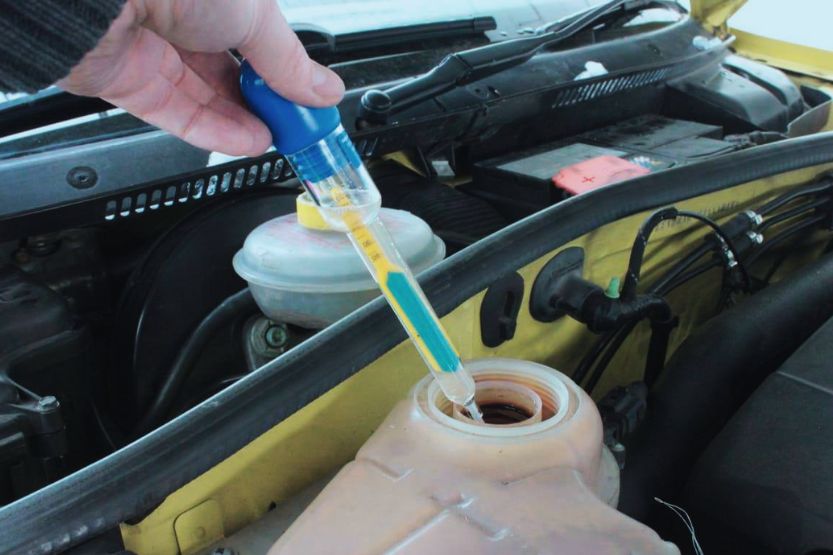
Here’s how you will conduct this test:
- Allow the engine to cool down.
- Remove the radiator cap and then start the engine.
- Set the multimeter to DC volts and at 20 volts or less.
- Monitor the engine temperature on the dashboard and wait until it reaches its normal operating temperature.
- When the normal engine temperature is reached, insert the positive probe of the multimeter directly inside the coolant reservoir.
- Rev the engine to 2,000 rpm.
- Put the multitester’s negative probe into the battery’s negative terminal.
- The voltage reading should be 0.4 volts or less. This means your coolant is still Okay. However, if the reading is more than 0.4 volts, your antifreeze has already degraded. You need a coolant flush and replacement.
How to Tell If the Antifreeze Has Gone Bad
The lasting capability of your engine depends on proper maintenance. One of the maintenance procedures that you should not take lightly is the periodic antifreeze flush.
To determine if your car is already up for antifreeze flush, you need to know the signs of degraded antifreeze. What are these signs?
1. Hard to Start Engine
Do you find it hard to start your engine in the morning, whether winter or summer? This problem could be related to old and degraded antifreeze.
If the antifreeze you are using in your car has already lost most of its cooling properties, it will translate to a hard starting engine, no matter if the outside temperature is cold or hot.
Monitoring the coolant reservoir will help you assess if the coolant is causing the problem. Check if its level in the reservoir is fluctuating. If it does, it means it can no longer cool the engine. You have to pour in new antifreeze and flush out the old one.
2. Engine Overheats Easily
If you find that your engine overheats quickly after driving only for a few miles, then that means your cooling system is not functioning properly. Your car’s cooling system is supposed to keep the engine running at its normal operating temperature.
Be aware that there could be other reasons your engine heats easily, such as a faulty thermostat, worn-out or bad hoses, cracked or clogged radiators, and so forth.
3. Antifreeze Smell Inside the Cabin
If the smell of antifreeze is seeping inside the cabin, it could mean a leak somewhere in the cooling system. The smell of antifreeze has a sweet aroma to it. It is comparable to the scent of maple syrup or candy.
So, if you can pick up this kind of smell inside the cabin, there is a leak in your cooling system. Have a qualified mechanic check it so they can stop the leak.
Again, does antifreeze expire? A sealed bottle of coolant or antifreeze has an indefinite shelf-life. Store it in its original container after opening so it can last for years. Also, pre-mixed coolant has a shorter lifespan than pure antifreeze.
How Often Does Your Car Need a Coolant Flush?
If the coolant works well, you won’t have any engine overheating problems. But when the engine overheats easily, one of the first things you need to check is the quality of the coolant. You must flush it and use new antifreeze if it is already degraded.
Most Manufacturers Recommend Antifreeze Flush Every 30,000 Miles
To prevent engine overheating problems, you need to know how long the antifreeze you are using will last. In general, most car manufacturers recommend flushing the antifreeze every 30,000 miles.
Hyundai Recommends Antifreeze Replacement After 60,000 Miles
Hyundai, for instance, recommends that owners replace antifreeze in their engines after the first 60,000 miles. After that, it should be flushed out every 30,000 miles. In some engines of Mercedes-Benz vehicles, the interval is 120,000 miles or after every 12 years.
Other Car Manufacturers Recommend Antifreeze Flush More Often
But other car manufacturers recommend the flushing of antifreeze more frequently than the 30,000 miles standard if the vehicles are used in ‘severe service’ work. These include tow trucks, trailer trucks, and similar vehicles.
Settle for Antifreeze Schedule Indicated in the Owner’s Manual
If you use your car for daily drives only and seldom for outdoor excursions, you can settle for the antifreeze schedule indicated in the owner’s manual. You don’t have to be too worried that you are stretching the life of your antifreeze.
Today’s vehicles generally have longer intervals for all types of fluid changes. The government requires manufacturers to reduce the waste fluids that need to be recycled or disposed of. And that includes antifreeze.
Even then, the antifreeze will eventually degrade as you drive your car year in and year out. You should test it regularly to see if it is still capable of providing the cooling effect needed by the engine. The simple test I have described above will greatly help in doing this.
Why Is the Coolant Overheating?
If there is a problem in the airflow system of your car, it will prevent cool air from going to the radiator. The radiator uses cooler air to keep the temperature of the coolant at the right level. So, if there’s a blockage in the cool air passage, the coolant will overheat.
The blockages can develop in the air filter. They could be some debris or stray leaves that got their way in the front grill of your car.
The coolant will also overheat when it is already old and has degraded. A water pump issue can also cause the coolant to overheat. If the water pump is malfunctioning, it won’t be able to circulate the coolant to cool the engine. The antifreeze will remain in one place and will eventually get hot.
Frequently Asked Questions – Does Antifreeze Expire? Does It Go Bad?
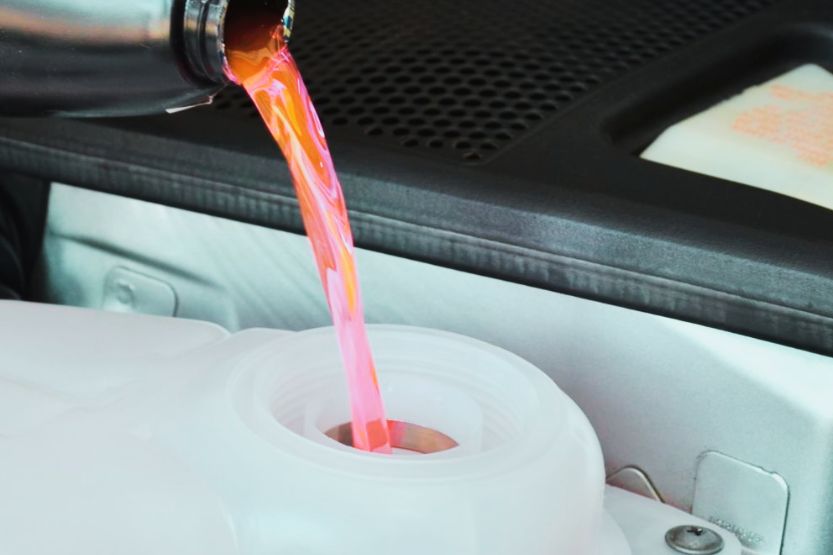
If you still have questions about how long you can use the antifreeze that is now inside your coolant reservoir, perhaps you will get your answers below:
Does Antifreeze Expire?
No, it will not expire if you keep it inside its original bottle. Once you open the bottle, the antifreeze will still be good for many years – if you keep the remaining amount in the original bottle.
How Can I Know If the Antifreeze in My Car Is Still Good?
You can check if the coolant is still good by conducting a simple test. To do this test, you will need a multimeter, digital or analog.
You need to know the coolant’s conductivity (in Volts) inside the reservoir. The voltage of the antifreeze inside the reservoir should be 0.4 volts or less. If the voltage reading exceeds 0.4 volts, you should replace the coolant. It is no longer in good condition.
How Long Can Antifreeze Last?
Antifreeze should last at least 30,000 miles. The actual length of time depends on the vehicle type and the driving conditions.
What Degrades Antifreeze?
Antifreeze degrades as it is being used. Over time, it needs to be flushed out and replaced. When you pour antifreeze into the coolant reservoir, it will react to the other liquids circulating the engine.
That’s the start of its deterioration. In winter, the antifreeze can become slushy if there’s too much water mixed in it. It has already degraded when that happens.
What Are the Signs of Degraded Antifreeze?
Several signs show that antifreeze has already deteriorated. They include the following:
- Hard starting engine, whether it is winter or summer
- Engine overheats easily
- The smell of antifreeze inside the cabin
When Should I Change the Antifreeze in My Car?
Generally, car manufacturers recommend changing coolant or antifreeze after every 30,000 miles – if you are using silicated coolants. This is the green-colored coolant that is mostly used in modern vehicles.
If you use extended drain coolant, you can change it every five years or 100,000 miles. To be sure, check your owner’s manual. It should include instructions as to when you should flush your antifreeze.
Does Antifreeze Evaporate?
Yes, antifreeze also evaporates. Given the hot temperature inside the engine bay as you drive your car, it is not difficult to see that any liquid circulating in the engine will be subjected to evaporation.
That is one of the reasons you need to monitor the coolant level in the reservoir. The level should not go below the minimum level, or you will have engine problems.
In Closing: Does Antifreeze Go Bad and Expire?
If you keep the antifreeze in a sealed bottle, it will have an indefinite shelf life. Even if you open the bottle, it will still have a long shelf life. Although pre-mixed coolant and antifreeze have long shelf lives, antifreeze tends to have a longer shelf life if it is not mixed with water.
A simple test lets you know if your antifreeze is still in good condition. You need to run your engine, and you need a multimeter. Use the multimeter to take the voltage reading of the coolant. Your antifreeze is still okay if the voltage reads 0.4 volts or less.
Read next:

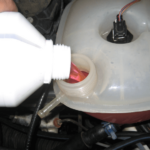
![How to Put Antifreeze in Car [Where Does Antifreeze Go?] how to put antifreeze in car](https://roadsumo.com/wp-content/uploads/2022/01/how-to-put-antifreeze-in-car-150x150.jpg)




